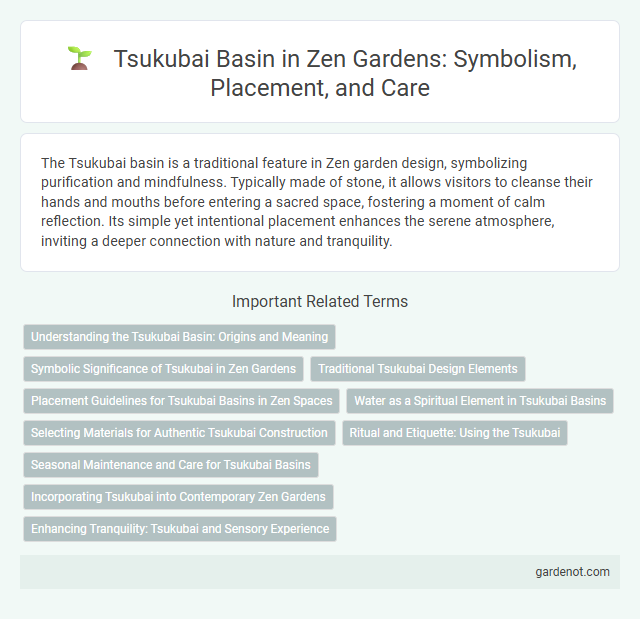The Tsukubai basin is a traditional feature in Zen garden design, symbolizing purification and mindfulness. Typically made of stone, it allows visitors to cleanse their hands and mouths before entering a sacred space, fostering a moment of calm reflection. Its simple yet intentional placement enhances the serene atmosphere, inviting a deeper connection with nature and tranquility.
Understanding the Tsukubai Basin: Origins and Meaning
The Tsukubai basin, a traditional feature in Japanese Zen gardens, originates from tea ceremony practices where visitors cleanse their hands and mouths as a symbol of purification. This stone water basin embodies humility and spiritual cleansing, reflecting the core principles of Zen Buddhism. Its placement and design emphasize mindfulness, encouraging contemplation and respect for nature's simplicity.
Symbolic Significance of Tsukubai in Zen Gardens
The Tsukubai basin in Zen gardens symbolizes humility and spiritual purification, inviting visitors to bow and cleanse their hands and mouth before entering sacred spaces. Its placement and simplicity reflect the Zen principles of mindfulness and self-restraint, fostering a meditative atmosphere. As a ritualistic element, the Tsukubai embodies the transition from the mundane to the sacred, deepening the contemplative experience within the garden.
Traditional Tsukubai Design Elements
The Traditional Tsukubai design features a low stone basin, typically carved from granite, placed at a height that encourages humble bowing when used. Water flows gently into the basin through a bamboo spout, known as a kakei, symbolizing purity and renewal within Zen gardens. Surrounding elements often include carefully arranged stepping stones and natural moss, enhancing the meditative ambiance and reflecting the principles of simplicity and tranquility.
Placement Guidelines for Tsukubai Basins in Zen Spaces
Tsukubai basins should be strategically placed near the entrance or along a pathway to encourage mindfulness and purification before entering a Zen garden. Position the basin at a comfortable height, typically around knee level, and incorporate natural stone materials that blend seamlessly with surrounding elements such as moss and bamboo. Ensure adequate water flow and drainage to maintain cleanliness while preserving the tranquil ambiance essential to traditional Zen garden aesthetics.
Water as a Spiritual Element in Tsukubai Basins
Tsukubai basins in Zen gardens symbolize purity and spiritual cleansing through the gentle flow of water, encouraging mindfulness and reflection. The water in these basins serves as a meditative focal point, representing the continuous flow of life and the impermanence of all things. This element fosters a serene atmosphere, inviting visitors to enter a state of tranquility and spiritual renewal.
Selecting Materials for Authentic Tsukubai Construction
Selecting authentic materials for constructing a Tsukubai basin involves choosing natural stones like granite or basalt, known for their durability and rustic appearance. Traditional craftsmanship emphasizes using unpolished, weathered stones to reflect wabi-sabi aesthetics and harmonize with the surrounding garden elements. Incorporating bamboo ladles and moss accents enhances the basin's authenticity, creating a serene focal point within the Zen garden.
Ritual and Etiquette: Using the Tsukubai
The Tsukubai basin plays a crucial role in the ritual purification process before participating in a tea ceremony, symbolizing humility and respect. Visitors scoop water with a ladle to cleanse their hands and rinse their mouths, following precise etiquette to maintain cleanliness and spiritual readiness. This practice emphasizes mindfulness and reverence, aligning with the Zen principles embodied in the garden's design.
Seasonal Maintenance and Care for Tsukubai Basins
Seasonal maintenance of Tsukubai basins involves regular cleaning to remove debris, algae, and mineral deposits that accumulate from changing weather patterns. Proper care includes monitoring water levels during dry seasons and ensuring drainage systems prevent stagnation or overflow during rainy periods. Routine inspections of stone integrity and surrounding vegetation help preserve the aesthetic and functional balance essential to Zen garden harmony.
Incorporating Tsukubai into Contemporary Zen Gardens
Incorporating the traditional Tsukubai basin into contemporary Zen gardens enhances the space with its symbolic ritual of purification and mindfulness. Modern designs often blend natural stone basins with minimalist elements, creating a harmonious balance between tradition and simplicity. This fusion promotes tranquility while offering an authentic cultural experience rooted in Japanese Zen aesthetics.
Enhancing Tranquility: Tsukubai and Sensory Experience
The Tsukubai basin in a Zen garden enhances tranquility through its carefully crafted water flow, creating soothing sounds that promote mindfulness and calm. Its stone basin encourages ritual purification, inviting visitors to cleanse hands and mouth, fostering a sensory connection that deepens meditation. Natural elements like smooth river stones and gentle water movement engage sight, sound, and touch, amplifying the garden's peaceful ambiance.
Tsukubai basin Infographic

 gardenot.com
gardenot.com